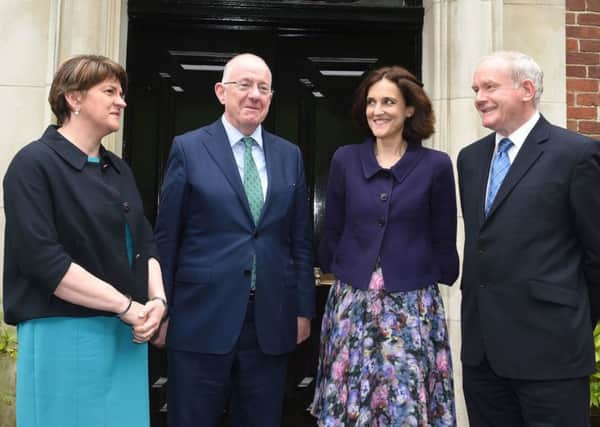PM says legal advice is clear '“ Scotland and NI bound by Brexit vote


David Cameron – who was on the same side as the nationalists during the campaign, urging a pro-EU vote – told the House of Commons that he had legal advice which confirmed that the UK-wide result binds the entire nation, despite Northern Ireland and Scotland voting Remain.
Responding to a question from Labour leader Jeremy Corbyn after a statement to the Commons about the EU summit on Tuesday, Mr Cameron said that he wanted the UK’s devolved regions to be “as involved as possible and I want their voices to be heard loud and clear”.
Advertisement
Hide AdAdvertisement
Hide AdThe Prime Minister went on to say: “The legal advice that I have seen is that this is a UK decision to be made by the United Kingdom Government and the United Kingdom Parliament. It has to be done in that way.”
But on Wednesday night Sinn Fein Deputy First Minister Martin McGuinness continued to insist that Northern Ireland should be excluded from Brexit. He said: “This is not a done deal. There is still a lot to be played for and we will be asserting the rights of those who voted to remain in Europe.
“The Irish government needs to represent the democratic will of the people of the North and to work in the best interests of all Irish citizens.
“Sinn Fein will continue with our campaign to secure and win a referendum for Irish unity.”
Advertisement
Hide AdAdvertisement
Hide AdEarlier on Wednesday, Secretary of State Theresa Villiers said that Scotland and Northern Ireland will not be able to attain special EU status in the wake of Brexit. She dismissed the suggestion that regions that voted Remain could have a relationship with the EU distinct from England and Wales, where majorities voted Leave.
While the referendum result has raised the prospect of another vote on Scottish independence and prompted Sinn Fein to demand a border poll on Irish unity, pro-Remainers in Scotland and Northern Ireland have also called for special measures to ensure their EU links are maintained, whatever the constitutional consequences of Brexit.
Ms Villiers, who campaigned for a Leave vote, said the UK would be treated as one nation in negotiations with the EU. The Secretary of State was in Belfast for a day of talks on Brexit and other Northern Ireland-specific issues with the Stormont’s leaders and Irish Foreign Minister Charlie Flanagan.
She said: “EU rules are very clear, membership is at member state level.
Advertisement
Hide AdAdvertisement
Hide Ad“It’s a national question, it’s not possible within EU rules to have a part of a country being part of the European Union.
“So this decision has been made, the people of the United Kingdom have voted to leave the European Union - that decision is going to be respected, that’s what the Government will take forward.”
Ms Villiers said “particular interests” in Northern Ireland, primarily the fact it shares a land border with an EU state, would need to be “protected” in the negotiations.
The Conservative MP again moved to allay fears expressed by communities on both sides of the Irish border that free movement of goods and people will be curtailed after Brexit.
Advertisement
Hide AdAdvertisement
Hide Ad“I believe we can keep a border which is as open and free-flowing as it is today,” she said.
“I believe it is in the interests of both the UK and Irish governments to do that. It’s clear both governments want to keep an open border. I believe, in those circumstances, it’s going to be deliverable. It will take some common sense, it will take some negotiation, but it’s not rational for the European Union to want to block something which is in the interests of one of its remaining member states - i.e. Ireland.”
On other specific Northern Ireland issues, Ms Villiers said:
:: The Brexit result will not change the Treasury’s stance that a forthcoming cut in corporation tax in the region will have to be paid for by the Stormont Executive. Current EU rules require the devolved region to foot the bill for the shortfall.
Advertisement
Hide AdAdvertisement
Hide Ad“The circumstances for devolution of corporation tax have been agreed and they don’t change as a result of the Brexit vote,” she said.
:: The Stormont Executive is likely to have the responsibility for allocating money to replace EU farm subsidies when the UK exits, as agriculture policy is a devolved matter.